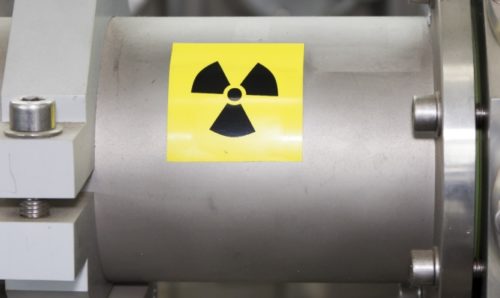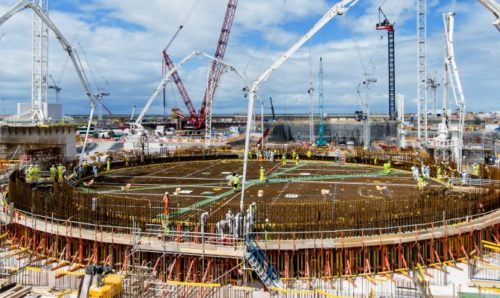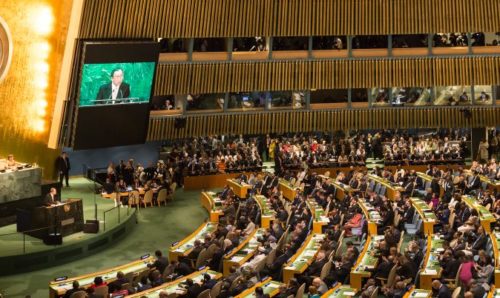
History of the radiation warning symbol
Recently, I was asked the intriguing question: “where did the black and yellow symbol for radioactivity come from?” What surprised me was that, despite using it almost every day in the lab, I hadn’t even considered its origin before now. So I did some digging. The life of the radioactive ‘trefoil’ began in 1946 at […]

Wylfa Newydd: Why the opposition?
The recent protests against the proposed Wylfa Newydd nuclear power station have brought to the media’s attention a very pressing issue: lots of people don’t want to live near nuclear power stations. While public support for nuclear power outweighs opposition [1], proposed nuclear sites often face resistance from local communities. This is despite the promises […]

Chernobyl Zone of Alienation
Having discussed the engineering and installation of the Chernobyl NSC, it is important to keep in mind the lasting impact of the accident on the local population and the surrounding environment. Ellis Rintoul examines the Chernobyl exclusion zone and the future of this vast area of contaminated land. The Zone of Alienation, commonly known as the […]

Chernobyl NSC: A Test of Time
The nuclear accident at Chernobyl Nuclear Power Plant has been discussed previously on Hitchhiker, with features mainly focusing on the immediate history of the disaster. Today, the Chernobyl site remains a concern within the nuclear industry, and the containment of radioactive material is crucial when considering environmental and social impact. The Chernobyl New Safe Confinement (NFC) is designed […]

Introducing: Chernobyl New Safe Confinement
This month we will be discussing the Chernobyl New Safe Confinement and what impact the new construction might have on public and scientific opinion of the disaster. Mark Williams introduces the NSC with a short piece on why the arch is necessary. Many will have seen the time-lapse above and noticed an unusually positive response (for nuclear) to the […]

DENMARK’S NUCLEAR PERCEPTION – TURNING TIDES WITH CAUTIOUS OPTIMISM
By Eirik Eide Pettersen A positive public opinion of nuclear energy is essential for its success. Nevertheless, in a number of countries it has proved difficult to convince the public of the benefits of nuclear power over the 70 year history of the nuclear industry. One country that has been particularly affected by a […]

Brexit: Britain’s Nuclear Future
With the vote cast and Britain leaving the EU, it’s hard to say what’s going to happen. Ellis Rintoul takes a look at what people have been saying. The new nuclear build in the UK, planned in order to replace our fleet of ageing nuclear reactors, is being controversially pioneered by the new pressurised water […]

The Nuclear Paradox
There’s a paradox when it comes to radioactive material and its portrayal to non-specialists; the fact that radiation is easily detected. The quantification of how radioactive a material is, at first glance, appears quite scary, particularly because it’s so unfamiliar to us. What the heck is a Bequerel or a Sievert after all? After Fukushima, […]

Trident comes back up for air
It came as little surprise last Monday when parliament, with a stubborn Theresa May at the helm, voted to renew the UK’s infamous Trident nuclear weapons programme. Party-politics played a large part in the shallow motives of the vote, but are there wider issues at play? With only a decade left on their use-by labels, […]

Five years since Fukushima: inconsistency, indecision and in-house fighting fuelling the media frenzy.
By Helena S Davies It is just over five years since the Fukushima Diiachi explosion, caused by the impact of the earthquake derived tsunami that devastated the east coast of Japan, on March 11th, 2011 and a question was posed to me with regards to reflecting on how the media responded to the disaster. After […]

Nuclear Power in Fiction
Nuclear power is emotive, some artists use this to produce some of the most pervasive and fascinating media. Daniel Cooper takes us through, and critiques, some of the media he’s been consuming lately. Occupied Occupied (or Okkupert) is a Norwegian TV series which aired recently in the UK on Sky Arts. In the near future, […]

Nuclear power: why educating the public won’t work
The Hitchhiker’s have be grappling with one of the hardest, and most important questions this month, ‘Education : how do we engage the public?’. Caroline McCalman, provides some perspective. Three years ago, a few months into my PhD, my colleagues and I in the Nuclear Societies research network at the University of Sheffield were invited to attend the annual […]

Nuclear disaster news: a case study.
Marika Hietala, Ph.D. researcher from The University of Sheffield, discusses and compares how the news of the Fukushima Daiichi nuclear disaster was distributed in West Cumbria (UK) and Satakunta (Finland). Fukushima: Initial reception When the nuclear disaster occurred in Fukushima in March 2011 I was busy with my undergrad dissertation and as a result, oblivious to […]

Fukushima – pointing the finger
The sheer amount of media coverage of the 2011 Fukushima Daiichi nuclear disaster has been nothing short of staggering. Huge initial television and newspaper coverage of the incident as it unfolded bloated into a swathe of online articles and blogs by both professional journalists and members of the public. The advent of social media meant […]

Fukushima – the reacton from nuclear engineering communities
The Fukushima-Daiichi meltdowns certainly turned the opinions of many people and governments against nuclear power – including Germany and Italy, the UK being a notable exception. However, the reaction within the nuclear research and engineering community itself has not been one of ‘radical re-thinking’ or ‘course changes’. Amongst technologists, what transpired in Japan isn’t really […]

